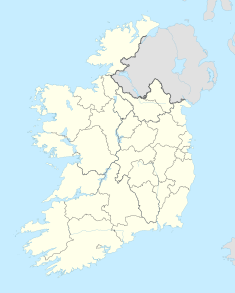Derryhiveny Castle
| Derryhiveny Castle | |
|---|---|
| Native name Caisleán Dhoire Shuibhne (Irish) | |
 | |
| Type | tower house |
| Location | Derryhiveny South, Portumna, County Galway, Ireland |
| Coordinates | 53°07′38″N 8°11′33″W / 53.1271°N 8.1924°W |
| Built | 1643 |
| Owner | State |
| Official name | Derryhiveny Castle |
| Reference no. | 283[1] |
Derryhiveny Castle is a tower house and National Monument located in County Galway, Ireland.[2][3]
Location
[edit]Derryhiveny Castle is located 4.4 km (2.7 mi) northeast of Portumna, on the west bank of the Shannon.[4][5]
History
[edit]The O'Madden family held the lands around Derryhivenny from c. AD 950 until the middle of the seventeenth century. On 5 February 1639, the head of the family, John O'Madden died, leaving his lands to his son, Daniel O'Madden. Daniel then set about building himself a tower house,[6] around 1643.[7] Its date is known from an inscription on one of its bartizan corbels: D:O'M ME:FIERI:FECIT 1643.
Description
[edit]Derryhiveny Castle is a tower house of four storeys. There are vaults on all four storeys.[citation needed] The upper rooms have two- and three-mullioned windows with fireplaces, including one with a chamfered lintel, curved downwards at each end and covered by a chamfered cornice.[8][9][10]
There are also remains of a bawn, wall walk and crenellations.[11][12][13][14][15][16]
References
[edit]- ^ "National Monuments of County Galway in State Care" (PDF). heritageireland.ie. National Monument Service. p. 3. Retrieved 27 July 2020.
- ^ "Castles of Co. Galway". homepage.eircom.net. Archived from the original on 24 May 2018. Retrieved 22 March 2018.
- ^ Day, Catharina (22 March 2018). Ireland. New Holland Publishers. ISBN 9781860113277 – via Google Books.
- ^ "Madden of Derryhiveny - Burke's East Galway". Archived from the original on 23 March 2018. Retrieved 22 March 2018.
- ^ Kerrigan, Paul M. (22 March 1995). Castles and Fortifications in Ireland, 1485-1945. Collins Press. ISBN 9781898256120. Archived from the original on 4 April 2022. Retrieved 2 October 2020 – via Google Books.
- ^ "Abandoned Ireland". www.abandonedireland.com. Archived from the original on 2 June 2016. Retrieved 22 March 2018.
- ^ "Derryhiveny Castle was built in 1643 by Daniel O'Madden". Archived from the original on 23 March 2018. Retrieved 22 March 2018.
- ^ "Irish Castles, County Galway". www.irelandseye.com. Archived from the original on 23 March 2018. Retrieved 22 March 2018.
- ^ "Derryhivenny Castle Portumna County Galway Ireland". portumna.galway-ireland.ie. Archived from the original on 23 March 2018. Retrieved 22 March 2018.
- ^ "Derryhivenny Castle, County Galway". www.irelandseye.com. Archived from the original on 18 March 2015. Retrieved 22 March 2018.
- ^ Glin, Knight of; Peill, James (22 March 2018). Irish Furniture: Woodwork and Carving in Ireland from the Earliest Times to the Act of Union. Yale University Press. ISBN 978-0300117158. Archived from the original on 4 April 2022. Retrieved 2 October 2020 – via Google Books.
- ^ "Derryhivenny". irishantiquities.bravehost.com. Archived from the original on 5 November 2016. Retrieved 22 March 2018.
- ^ Sweetman, David (22 March 1999). Medieval Castles of Ireland. Collins Press. ISBN 9781898256755. Archived from the original on 4 April 2022. Retrieved 2 October 2020 – via Google Books.
- ^ "Emigrant Fathers, Native Sons: Shane Family of Prescott County, Ontario, Canada, 1817-1990". K.M. Adamson. 22 March 1990. Archived from the original on 4 April 2022. Retrieved 2 October 2020 – via Google Books.
- ^ Spellissy, Sean (1 January 1999). The history of Galway. Celtic Bookshop. ISBN 9780953468331. Archived from the original on 4 April 2022. Retrieved 2 October 2020 – via Google Books.
- ^ "Viking Congress". Oliver and Boyd. 22 March 2018. Archived from the original on 4 April 2022. Retrieved 2 October 2020 – via Google Books.

